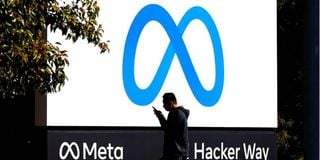Ethiopians sue Facebook at Kenyan High court, seek Sh250bn for online hate speech

Facebook employees unveil a new logo and the name 'Meta' on the sign in front of Facebook headquarters on October 28, 2021 in Menlo Park, California.
Two Ethiopians have filed a suit against Facebook parent company, Meta, seeking more than Sh250 billion compensation for victims of hate and violence allegedly fueled by the social media giant.
The precedent-setting case filed in the High Court accuses Meta Platforms Inc of fueling violence in East Africa by failing to moderate inciteful messages posted on Facebook.
Mr Abrham Meareg says his father, Prof Meareg Amare Abrha, was killed in November last year in the war between the Ethiopian government and the Tigray People’s Liberation Front (TPLF). He says a post on Facebook profiled and accused his father of associating with TPLF.
Another petitioner Fisseha Tekle, a legal adviser at Amnesty International says human rights groups cannot protect people’s rights if the social media people rely on for news and connection fuels hate and disinformation.
Through lawyer Mercy Mutemi, the two want the High Court to compel Meta to create a restitution fund of Sh200 billion for victims of hate and violence perpetrated by Facebook.
“Upon the finding of liability as prayed above, an order establishing the Facebook Advertisements Victims Fund in Kenya to be administered by this honourable court or its nominee and to which the respondent shall be required to deposit Sh50 billion for the benefit of any Facebook user in Kenya who has been shown a boosted or sponsored post containing content that constitutes inciteful, hateful and dangerous speech,” the petition states.
This is the second case Meta is facing in Kenya after a South African man, who was employed as a content moderator, accused the giant social media company of exploitation and poor working conditions at its Nairobi office.
A ruling is pending on whether the High Court has jurisdiction to hear the matter.
The latest case accuses Meta of failing to take action against inciteful, hateful and dangerous content in order to protect its business interests.
“Put otherwise, the respondent benefits from the prioritisation of hateful, inciteful and dangerous content on its platform,” the petition reads.
Ms Mutemi says Facebook has become one of the channels through which terrorist propaganda is shared and although the company is technologically able to adjust and restrict Facebook’s viral algorithm, it has chosen to ignore such content in East and Southern Africa.
She says the company has previously protected Facebook users in the US, but failed to invoke it to protect communities elsewhere.
She says on January 6, 2021, when there was an attack on the US Capitol that disrupted a joint session of the Congress, Meta deployed the ‘Break the Glass’ (BTG) procedure, which was able to mute hateful and dangerous content.
The BTG is a long series of specific algorithmic changes deployed in times of crisis situations where dangerous content is quickly removed and prevented from further distribution.
The petition says many people have suffered human rights violations because Meta refused to take down Facebook posts that violated the bill of rights even after reports were made to the company.
The petitioners want all those Facebook users within Kenya whose rights have been violated in a similar way or they reported inciteful, hateful and dangerous content which was not taken down and led to further violation of their rights, to be compensated.
Mr Abrham says the post on his father was made in October last year, identifying him as a Tigrayan, and falsely associating him with TPLF, put his life at risk.
The posts attracted comments and details of his father’s place of work were shared, making it possible for people to track him down and cause him harm, he says.
He reported the post to Meta several times and brought it to the attention of the moderator based in Nairobi for violating community standards, but the post was not pulled down.
Prof Meareg was allegedly tracked down by gunmen and shot dead. His family was forced to flee and cannot return to their home.
“If Facebook had just stopped the spread of hate and moderated posts properly, my father would still be alive,” he says in a statement. “I’m seeking justice for millions of my fellow Africans hurt by Facebook’s profiteering — and an apology for my father’s murder,” says Mr Abrham.





